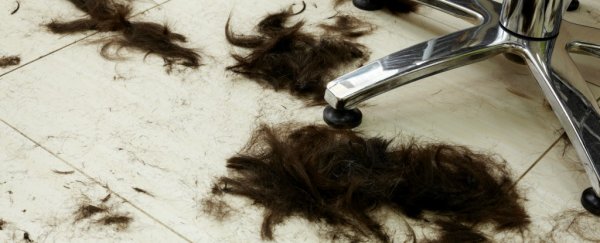Offcuts of human hair could be used to help clean up environmental disasters such as oil spills, according to new research being conducted in Australia.
It sounds a little strange, but it could mean we use a cheap and natural product to clean up oil, instead of the synthetic or expensive products currently used.
"There are a lot of different materials that are used in contamination cleanup… a lot of them are synthetic products, particularly things that are made of polypropylene and other types of plastic polymers," said Rebecca Pagnucco, a student completing her Masters at the University of Technology Sydney (UTS).
"There's recently been a lot of media attention around marine plastic pollution and whether particular types of dispersants are actually doing more harm than good trying to clean up oil sites."
Although long hair is valued for making wigs, short off cuts, such as the stuff found on the floor of a hair salon is waste – usually going into landfill.
But Pagnucco and her supervisor at UTS, Megan Phillips, thinks it could be much more valuable when put to use in contamination clean up because of the properties of the hair itself.
"Hair is a natural biosorbent," she said. "It's been shown to adsorb 3-9 times its weight in oil."
"Your hair gets oily and greasy - the oil basically is stuck to the hair fibres. By a similar method, it would stick to other oils, such as crude oil," she added.
There's been a global push to use other natural fibres for oil spills and other clean ups, but the options currently aren't great.
"Cotton and wool can work very well because they are adsorbent obviously, but they are also quite valued in making textiles and clothing, so there's already another, more useful demand for them," Pagnucco said.
"Whereas with something like hair, there's no value in it once you've cut it off your head, its waste."
She also thinks that the hair could be reused a number of times – if you've ever washed your hair you'll know that it gets oily again soon enough.
"Hair can also be reused several times without a significant decrease in its ability to adsorb oil," she said.
Currently there are only a few studies using hair as a clean-up tool, but these studies have modified the hair in some way before it was used.
Pagnucco hopes her research will fix two birds with one stone – clean-up of dangerous oils, as well as limiting waste.
"It's really important that we start to find more sustainable ways of dealing with our waste," she said.
"My research is important because if we continue on the path we're on, our waste will continue growing and that has a flow-on effect on the whole environment."
Pagnucco's research is still not ready for producing papers about her work, but considering waste is only going to become more of an issue in the future – we're hoping for some interesting results.
UTS Science is a sponsor of ScienceAlert. Find out more about their research.
